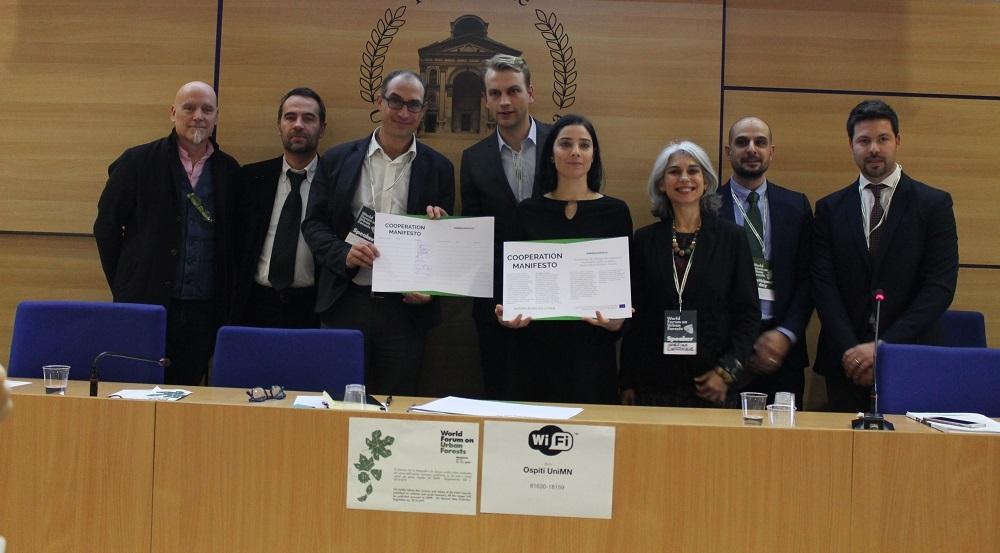Renaturing cities: cooperation manifesto launched at the World Forum on Urban Forests

URBAN GreenUp and other EU projects jointly signed a document in Mantua, Italy, to promote and boost the adoption of nature-based solutions in urban areas worldwide.
“Nature is often seen as a problem, here it is seen as the solution”. This sentence by Josefina Enfedaque may resume the sense of the 1st World Forum on Urban Foreststhat closed the month of November and opened December in Mantua on a deeply green note. The EC Senior Policy Officer, present at the invitation of URBAN GreenUp, participated in a number of gatherings related to NBS projects, which culminated, in November 30, in thelaunch of the first Nature-Based Solutions Cooperation Manifesto.
At the Forum, whose title was “Changing the nature of cities: the role of Urban forestry for a green, healthier and happier future”, URBAN GreenUp was leader in fostering NBS projects. The Forum, organised by FAO, the Municipality of Mantua, the Italian Society of Silviculture and Forest Ecology (SISEF), and Politecnico di Milano, in four days hosted conference sessions, exchanges, meetings, focus discussions, and public events.
On november 29 at the round table “Nature-Based solutions and the present”, Josefina Enfedaque, on behalf of the NBS Projects Cluster, gave a speech on “Transforming cities, enhancing well-being through Nature-Based solutions (NBS). The EU-led mission towards the urban green transformation.” She explained how NBS projects are funded by the EU Commission through the Horizon 2020 Research and Innovation Programme, with the aim of bringing together cities, citizens, research institutes and industry to demonstrate Nature-Based Solutions and business models that can be scaled up and replicated in a joint effort towards a green urban transformation at a global scale. Being a researcher herself, she stressed the difficulties of having EU policies keep up with scientific innovation: “We are trying to let all the people involved to know what policies are going to be reviewed in the future, what new policies could be drafted, so we can have already scientists all over putting in place all this research or this data,” she said. Enfedaque insisted on the utilitarian aspect of Nature-Based solutions, which must not be just decorative. “It’s not NBS if it doesn’t tackle the social, the environmental and the economy,” she stated.
On the same occasion Enfedaque also anticipated the launch of the Nature-Based Solutions Cooperation Manifesto, which took place on November 30.
The Manifesto, which aims at guiding the adoption of NBS by other cities, was presented and read in full by its initiator, URBAN GreenUp’s coordinator Raul Sanchez, who said: “We can’t solve our problems with the same thinking that created them.” His take is we need NBS to tackle some of the worst problems we created, “or at least the worst, climate change”. This manifesto, which can be signed online, is meant to show its signatories’ commitment to promote, research and implement Nature-Based solutions.
The presentation of the document was then followed by its signing by the projects present at the event (ThinkNature,Connecting Nature,ProGIreg,Nature4Cities, URBiNAT), as well as by Josefina Enfedaque herself and Adriana Nepote, Alderman for University, Research and Innovation at the Municipality of Mantua.
URBAN GreenUP partners and other NBS projects representatives and speakers attended then to a panel on overcoming barriers and enhancing benefits of Nature-Based solutions.
The side event presented a wide range of points of view on the topic - academic, technical, legislative, political, etc. Josefina Enfedaque expressed her frustration at the lack of resources, that she defined “a matter of political will”, and proposed as a solution the involvement of citizens, who are now more willing to vote for greener politics, especially in local elections, as it recently happened in Belgium. Involving citizens was given as a key to solving many NBS-related problems by a number of speakers. David Struik’s speech was specifically about this. The ThinkNature’s representative said that when it comes to sustainability, it is young people who educate their parents and their bosses. Giorgio Vacchiano, researcher in Forestry Sciences at the University of Milan, insisted on how trees and forests can improve life in cities and rural settlements, starting from their mitigating effect on climate change and the creation of microclimates, while Edoardo Croci, from Bocconi University, analysed what kind of business modelscan finance NBS in the private sector. Other topics addressed in the panel were the contribution of science to maximize NBS benefits, by CNR researcher Carlo Calfapietra representing ProGIreg; water management, by Domenico Perfido from Nature4cities; the legislative barriers, by Kaan Emir from URBAN GreenUp; and replication and social barriers by Thami Croeser from URBAN GreenUp.
Fondazione ICONS/iCube Programme co-authored the Manifesto together with CARTIF and organised the launch and the side event. They also submitted Enfedaque’s abstract to the November 29 panel.



